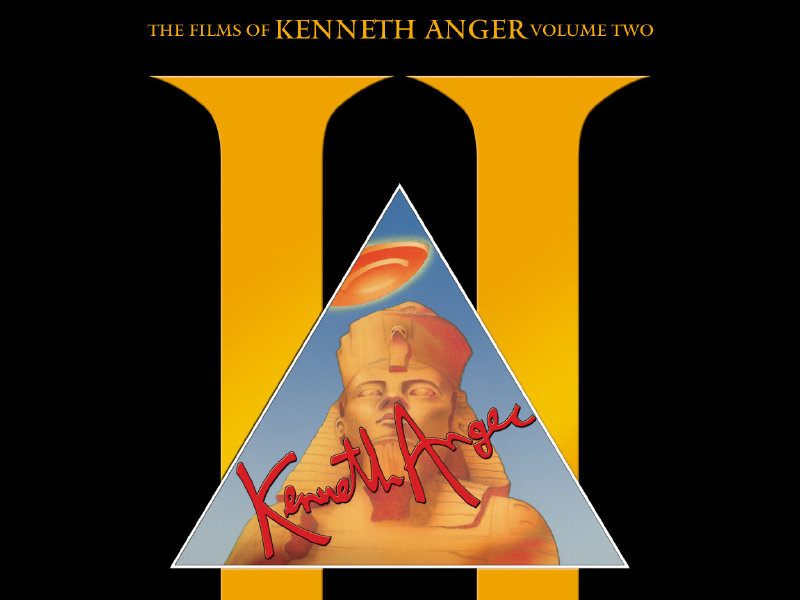When Fantoma issued “The Films of Kenneth Anger: Volume One” at the start of the year, serious film fans rejoiced. Even the Village Voice enthused, “The latest blast from the avant-garde cannon … arrives this week on DVD in a terrific package.”
Now, the second DVD installment has arrived with five more Anger films, made from 1964 to 1981, and like its predecessor, it boasts stellar transfers, commentaries, a thick booklet and more. There is also another essay from Martin Scorsese drooling over Anger’s edgy films and an essay by Gus Van Sant, too.
The first two films are stylistic bedfellows. “Scorpio Rising,” from 1964, and Kustom Kar Kommandos, from the following year,” focus on motorcycle and hot rod fetishists. They are all polished chrome, studded leather and lingering shots on rugged dungareed crotches; overlaid with sugars girl group pop music. He’s capturing a fading era.
Jump ahead to 1969’s “Invocation of My Demon Brother,” with its wheezing bleep of a soundtrack by Mick Jagger, and Anger again is influenced by his time, even if the psychedelic visuals of the film were arguably becoming a bit dated by then. Here, too, is where the suggested sexuality, simmering just below the surface in the first two films, exposes itself with shots of naked men lounging about and, later, wrestling.
Clearly always influenced by current trends, Anger went “No Wave” for 1981’s “Rabbit’s Moon” – based on kabuki tradition -- with its new wave disco soundtrack (think Marianne Faithfull’s “Broken English”) and the blue and white moonlit fable starring a Klaus Nomi-like Pierrot the clown, Columbina and a harlequin.
Finally, “Lucifer Rising,” perhaps the Anger film with the most controversy surrounding it. The story of its making is the story of a stolen film, a soured soundtrack collaboration with Led Zeppelin’s Jimmy Page and a replacement soundtrack recorded in prison by Manson family associate Bobby Beausoleil. Oh yes, and at least one lawsuit.
Anger’s interest in fetishism, the occult and folk like Aleister Crowley and Anton LaVey come to the fore in the films, which at times conjure the work of Pasolini in their explicit sexuality and their historical settings.
If these are not the equivalent of an evening spent watching “Extras” episodes and outtakes on DVD, that’s OK, they’re not meant to be. What this DVD and its companion do, honorably and respectfully, is document the work of one of America’s most interesting avant-garde filmmakers.
“When I watch these remarkable films,” writes Scorsese in the booklet, “the world as it was when I first saw them is transformed into essences: essential dangers, essential beauties, essential mysteries.”
Born in Brooklyn, N.Y., where he lived until he was 17, Bobby received his BA-Mass Communications from UWM in 1989 and has lived in Walker's Point, Bay View, Enderis Park, South Milwaukee and on the East Side.
He has published three non-fiction books in Italy – including one about an event in Milwaukee history, which was published in the U.S. in autumn 2010. Four more books, all about Milwaukee, have been published by The History Press.
With his most recent band, The Yell Leaders, Bobby released four LPs and had a songs featured in episodes of TV's "Party of Five" and "Dawson's Creek," and films in Japan, South America and the U.S. The Yell Leaders were named the best unsigned band in their region by VH-1 as part of its Rock Across America 1998 Tour. Most recently, the band contributed tracks to a UK vinyl/CD tribute to the Redskins and collaborated on a track with Italian novelist Enrico Remmert.
He's produced three installments of the "OMCD" series of local music compilations for OnMilwaukee.com and in 2007 produced a CD of Italian music and poetry.
In 2005, he was awarded the City of Asti's (Italy) Journalism Prize for his work focusing on that area. He has also won awards from the Milwaukee Press Club.
He has be heard on 88Nine Radio Milwaukee talking about his "Urban Spelunking" series of stories, in that station's most popular podcast.




